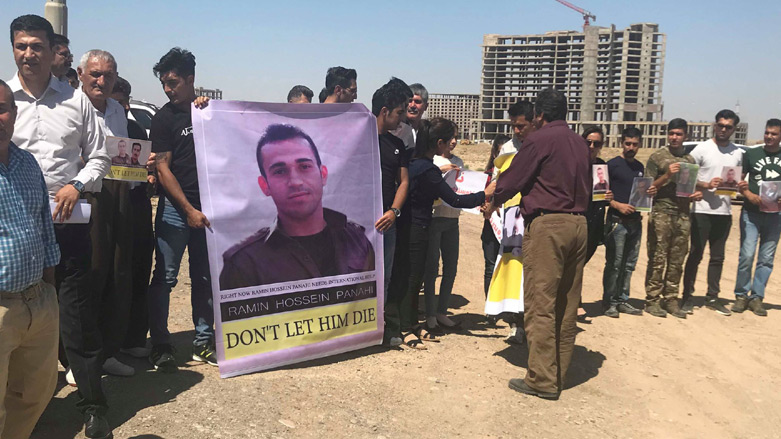Crowd in Erbil asks UN to pressure Iran to halt Kurd's execution

ERBIL (Kurdistan 24) – Protesters from Iranian Kurdistan (Rojhilat) and the Kurdistan Region gathered on Tuesday in front of the United Nations (UN) office in Erbil, asking the international community to use its influence to stop the execution of a condemned Kurdish prisoner in Iran.
Some held up photographs of Ramin Hossein Panahi, the Kurdish prisoner who has been jailed in Iran for months and has been reported to have spent a large percentage of his detention in solitary confinement.
Panahi was sentenced to death in January by an Iranian court in Sanandaj (Sina) for “taking up arms against the state.” His conviction was based on claims that he is a member of the armed Kurdish opposition group Komala, but no evidence was presented that would link him to crimes he was charged with, which included murder.
In April, Iran's Supreme Court approved the sentence.
“We demand the cancellation of the death sentence for Ramin Hossein Panahi who, unfortunately, has been sentenced unjustly by a so-called court in Iran,” a demonstrator said, reading a prepared statement to reporters in front of the UN compound.
The protestors urged the international organization to increase efforts to pressure Tehran into overturning the verdict, warning that the sentence could be implemented at any time and on any date and claiming that all necessary preparations had been made to carry out the execution.
In late April, a UN statement read, “Executing Mr. Panahi, following his torture, and unfair trial and on the basis of charges that do not meet international standards for the use of death penalty, would be unconscionable. We urge the Government of Iran to annul the death sentence."
Previously, international human rights organizations have voiced grave concerns about Panahi’s death sentence and urged Iranian authorities to overturn the execution.
The sentence came after ‘a grossly unfair trial and amid serious torture allegations,’ said Philip Luther, Amnesty International’s Research and Advocacy Director for the Middle East and North Africa.
“Ramin Hossein Panahi’s case has been a breathtaking miscarriage of justice from start to finish. After appearing at his trial reportedly bearing torture marks on his body he was convicted in less than an hour,” Luther added.
He continued, “During the investigation period, he was denied access to both his lawyer and his family, as well as to any details of the evidence against him. In a complete mockery of the judicial process, intelligence officials also repeatedly pressured him to make a televised ‘confession’ in exchange for the quashing of his death sentence."
"His refusal to submit to this pressure has seen him languishing in solitary confinement.”
In recent years, Iran has proven to be one of the leading nations in carrying out the death penalty against its citizens. Of the 993 people executed globally in 2017, 507 of them were in Iran, according to Amnesty.
“We urge the Iranian authorities not to compound this shocking catalogue of human rights violations by proceeding with what is the ultimate and irreversible denial of human rights," Luther previously stated.
"Ramin Hossein Panahi’s death sentence must be quashed now before it’s too late.”
Editing by John J. Catherine
